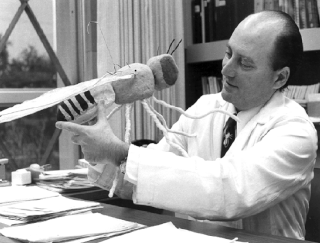Related Research Articles
Zoology is the scientific study of animals. Its studies include the structure, embryology, classification, habits, and distribution of all animals, both living and extinct, and how they interact with their ecosystems. Zoology is one of the primary branches of biology. The term is derived from Ancient Greek ζῷον, zōion ('animal'), and λόγος, logos.

The Little Red School House and Elisabeth Irwin High School, also referred to as LREI, is a school in Manhattan, New York City. It was founded by Elisabeth Irwin in 1921 as the Little Red School House and is one of the city's first progressive schools. Created as a joint public-private educational experiment, the school tested principles of progressive education that had been advocated since the turn of the 20th century by John Dewey. The founders postulated that the lessons of progressive education could be applied successfully in the crowded, ethnically diverse public schools of the nation's largest city.

Seymour Benzer was an American physicist, molecular biologist and behavioral geneticist. His career began during the molecular biology revolution of the 1950s, and he eventually rose to prominence in the fields of molecular and behavioral genetics. He led a productive genetics research lab both at Purdue University and as the James G. Boswell Professor of Neuroscience, emeritus, at the California Institute of Technology.
The Emory National Primate Research Center located in Atlanta, Georgia, owned by Emory University, is a center of biomedical and behavioral research, is dedicated to improving human and animal health, and is the oldest of seven National Primate Research Centers partially funded by the National Institutes of Health. It is known for its nationally and internationally recognized biomedical and behavioral studies with nonhuman primates by Emory University.

Human genetics is the study of inheritance as it occurs in human beings. Human genetics encompasses a variety of overlapping fields including: classical genetics, cytogenetics, molecular genetics, biochemical genetics, genomics, population genetics, developmental genetics, clinical genetics, and genetic counseling.

Monoamine oxidase A, also known as MAO-A, is an enzyme that in humans is encoded by the MAOA gene. This gene is one of two neighboring gene family members that encode mitochondrial enzymes which catalyze the oxidative deamination of amines, such as dopamine, norepinephrine, and serotonin. A mutation of this gene results in Brunner syndrome. This gene has also been associated with a variety of other psychiatric disorders, including antisocial behavior. Alternatively spliced transcript variants encoding multiple isoforms have been observed.
Pat Irwin is an American composer and musician who was a founding member of two bands that grew out of New York City's No Wave scene in the late 1970s, the Raybeats and 8-Eyed Spy. He joined The B-52s from 1989 through 2008. He currently performs and records with SUSS who have released several records on the indie label Northern Spy.

Irving Isadore Gottesman was an American professor of psychology who devoted most of his career to the study of the genetics of schizophrenia. He wrote 17 books and more than 290 other publications, mostly on schizophrenia and behavioral genetics, and created the first academic program on behavioral genetics in the United States. He won awards such as the Hofheimer Prize for Research, the highest award from the American Psychiatric Association for psychiatric research. Lastly, Gottesman was a professor in the psychology department at the University of Minnesota, where he received his Ph.D.

Bette Midler hit the road for the first time in four years with her 2003–05 Kiss My Brass concert tour. The first leg of the tour kicked off on December 10 in Chicago and went through the middle of February. The tour hit the top 40 cities across the U.S. with one stop in Toronto, Ontario, Canada. The first leg of the tour ended in Atlantic City, New Jersey and the second leg of the tour began in Manchester, New Hampshire and ended in Minneapolis, Minnesota.
Behavioural genetics, also referred to as behaviour genetics, is a field of scientific research that uses genetic methods to investigate the nature and origins of individual differences in behaviour. While the name "behavioural genetics" connotes a focus on genetic influences, the field broadly investigates the extent to which genetic and environmental factors influence individual differences, and the development of research designs that can remove the confounding of genes and environment. Behavioural genetics was founded as a scientific discipline by Francis Galton in the late 19th century, only to be discredited through association with eugenics movements before and during World War II. In the latter half of the 20th century, the field saw renewed prominence with research on inheritance of behaviour and mental illness in humans, as well as research on genetically informative model organisms through selective breeding and crosses. In the late 20th and early 21st centuries, technological advances in molecular genetics made it possible to measure and modify the genome directly. This led to major advances in model organism research and in human studies, leading to new scientific discoveries.

The Behavior Genetics Association (BGA) is a learned society established in 1970 and which promotes research into the connections between heredity and behavior, both human and animal. Its members support education and training in behavior genetics; and publish Behavior Genetics, a journal on the topic.
Jerome Edwin Hirsch was an American psychologist known for his pioneering work in behavior genetics, and for his advocacy for social justice. He has been described as "the pioneer who brought quantitative genetic analysis to the study of behavior."

Misbehaving Science: Controversy and the Development of Behavior Genetics is a 2014 book about the history of behavior genetics. It was written by University of California, Los Angeles sociologist Aaron Panofsky, and was published by the University of Chicago Press. It won the 2015 President's Book Award from the Social Science History Association.
Douglas Leon Wahlsten is a Canadian neuroscientist, psychologist, and behavior geneticist. He is a professor emeritus of psychology at the University of Alberta. As of 2011, he was also a visiting professor at the University of North Carolina at Greensboro in North Carolina, United States. He is known for his laboratory research on the behavior of mice, and for his theoretical writings on a wide range of other topics. His laboratory research has included studies of the effects of different laboratory environments and experimenter characteristics on the results of mouse studies. He and his colleagues have also developed an altered form of the rotarod performance test involving wrapping sandpaper around the rod, to reduce the ability of mice to grip the rod and ride around on it. He has criticized some of his fellow behavior geneticists for trying to separate the effects of genes and the environment on human intelligence, an endeavor he considers futile. He also met and became friends with Leilani Muir, later helping to edit her autobiography, A Whisper Past. He was the president of the International Behavioural and Neural Genetics Society from 2000 to 2001.
Benson Earl Ginsburg was an American behavioral geneticist who taught at the University of Chicago and the University of Connecticut. He was a co-founder of the Behavior Genetics Association.

Benjamin Bernard Lahey is an American psychologist and developmental epidemiologist. He is the Irving B. Harris Professor Emeritus in the Departments of Health Studies and Psychiatry and Behavioral Neuroscience at the University of Chicago. He has conducted research on psychological problems in children, adolescents, and adults such as ADHD and antisocial behavior, and he was a member of a scientific panel that constructed the current definition of ADHD in the 1990s. He was one of the authors of the papers that first hypothesized a hierarchical organization of dimensions of psychological problems, with a general factor at the top of the hierarchy. He is a fellow of the American Psychological Association and the Association for Psychological Science. He is also a member of both the International Society for Research in Child and Adolescent Psychopathology and the Society of Clinical Child and Adolescent Psychology, as well as a former president of both organizations. Lahey has received the Distinguished Research Award from the Society of Clinical and Adolescent Psychology.
OpenPsych is an online collection of three pseudoscientific open access journals covering behavioral genetics, psychology, and quantitative research in sociology. Many articles on OpenPsych promote scientific racism, and the site has been described as a "pseudoscience factory-farm". The journals were started in 2014 by a pair of nonprofessional researchers, Emil Kirkegaard and Davide Piffer, who had difficulty publishing their studies in mainstream peer-reviewed scientific journals. The website describes its contents as open peer reviewed journals, but the qualifications and neutrality of its reviewers and quality of reviews have been disputed.
Arpana Agrawal is a psychiatric geneticist and professor of psychiatry at Washington University School of Medicine, known for researching the roles of genetic and environmental factors in cannabis use and addiction. She also serves as Co-Chair of the Psychiatric Genomics Consortium working group on Substance Use Disorders. In 2018, she received the Theodore Reich Young Investigator Award from the International Society of Psychiatric Genetics. She also received the Fuller/Scott Award from the Behavioral Genetics Association in 2010 and the Henri Begleiter Excellence in Research Award from the Research Society on Alcohol in 2022.
References
- ↑ "Enough is enough or vujà dé". Times Higher Education. 1997-10-17. Retrieved 2018-03-10.
- ↑ Lilienfeld, Scott (2000-11-13). "First Person: Scott Lillenfeld and Irwin Waldman". Emory Report. Retrieved 2018-03-10.
- ↑ "The 41st Annual Meeting of the Behavior Genetics Association" (PDF). Behavior Genetics Association. 2011. Retrieved 2018-07-28.
- ↑ "Behavior Genetics Editorial Board". Springer Science+Business Media. Retrieved 2018-07-28.